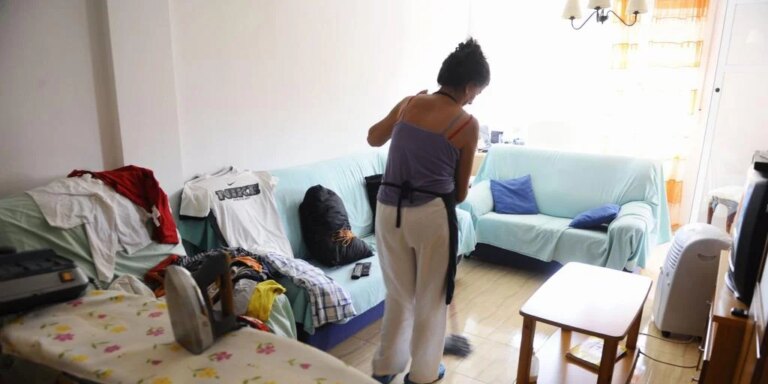
BEIJING, November 12 (EFE) – Spain’s King Felipe VI and Chinese President Xi Jinping met in Beijing this Wednesday, underscoring the strength and good momentum of their bilateral relations, reflected in the signing of 10 bilateral agreements on economic, scientific and cultural issues.
The meeting with Xi was the highlight of the second day of the king’s trip outside China, and also the most institutional. The meeting began with an official reception at the People’s Palace, where King Felipe VI met with President Xi, as well as Prime Minister Li Qiang and Legislative Council President Zhao Leji.
Since then King Juan Carlos I’s first official visit to the Asian country in 1978, “strong bilateral relations and mutual trust have been established, based on the principles of respect and shared prosperity,” the king said in front of the Chinese president.
Meanwhile, the host country’s president believed that his country and Spain have “together established an example of friendly coexistence and common development between countries with different histories, cultures and social systems, and have also made significant contributions to world cooperation in the defense of open development and international equity and justice.”
The delegation’s meeting led to the signing of more than a dozen bilateral agreements and memorandums of understanding, including protocols on aquaculture, fish oil, diets for animal feed, regionalization of African swine fever and food security.
The signed documents also include agreements between scientific institutions of the two countries and an agreement on co-production of films.
On this day, the king and others also laid wreaths in front of the Monument to the People’s Heroes of China in Tiananmen Square, paying their respects to the Asian nation’s fallen heroes. The monument is also a regular location for state visits by foreign dignitaries to the Asian giant.
This obelisk, completed in 1958, commemorates those who have fallen in conflicts and rebellions in modern Chinese history, from the Opium Wars to the revolution that overthrew the last emperor, or the war of resistance against Japanese invasion.
Before the event, Queen Letizia, together with China’s First Lady Peng Liyuan, visited the Disability Service Center, a 33,000 square meter national reference facility, to learn more about the various assistive technologies that facilitate the daily lives of people with disabilities.
Among the advances the Asian country has developed in this field are simultaneous translation glasses, robotic hands, and robotic guide dogs that use artificial intelligence (AI) to improve travel safety for visually impaired people.
The second day of the trip concluded with a state dinner hosted by President Xi and his wife, which featured traditional Chinese dishes such as lacquered Peking duck and Yangzhou-style fried rice, as well as wines from Asian countries where wine culture has been booming in recent years.
There, in front of 100 guests, the King emphasized the critical importance of China’s voice and engagement in dialogue on major global challenges in a world full of uncertainties.
Previously, President Xi Jinping was confident that the friendship between Spain and China would last forever, recalling that “those who have friends have treasures.”
After dinner, the Spanish king and his wife will attend a concert by the Royal Theater Orchestra at the National Center for the Performing Arts (NCPA). The concert marks the group’s debut in China and will feature Spanish music, especially works by Manuel de Falla and Amadeo Vives.
The king’s trip to the Asian giant ends tomorrow, Thursday, when King Felipe VI is scheduled to start with a breakfast with members of the Spain-China Business Advisory Council, before visiting the facilities of Spanish car metal parts manufacturer Gestamp.
Queen Letizia will hold a meeting with Chinese students studying Spanish at the University of Foreign Studies in Beijing, after which the two monarchs will host a reception for the Spanish colonies residing in China.
BEIJING, 12 November (EFE) – King Felipe VI on Wednesday stressed the vital importance of China’s voice and engagement in dialogue on major global challenges in a world filled with uncertainty, at a celebratory dinner given by Chinese President Xi Jinping to the Spanish King and others during his state visit.
Xi Jinping and his wife Peng Liyuan hosted a gala dinner at the Great Hall of the People in Beijing, attended by 100 guests, while the four met for a private dinner on Tuesday night upon arriving in Beijing from Chengdu, the first stop on a state trip.
In his speech at the gala dinner, the King of Spain recalled his own words at the recent United Nations General Assembly: “Let us not forget the harsh lessons that the 20th century has taught us. Let us never abandon the search for agreement, no matter how difficult it may be.”
The Spanish Head of State underlined the celebration of the 20th anniversary of the strategic partnership between Spain and China and more than 50 years of diplomatic relations, saying that as a result a new plan of action to strengthen the bilateral agenda was developed and approved with the signing of an agreement that brings strategic benefits in areas such as economy, agriculture, science and universities.
The Spanish King also referred to the currently existing complex geopolitical framework full of uncertainties, and Spain considers it essential to maintain a world order based on rules, multilateralism and cooperation.
In the economic field, Felipe VI recalled that China is currently Spain’s main trading partner outside the European Union, with bilateral trade valued at more than 50 billion euros last year, with significant Chinese investments in Spain in the production of renewable energy and electric vehicles, while Spain’s investments in China are present in areas such as energy, services and consulting.
He also highlighted culture as one of the strongest pillars of bilateral ties, as there are more than 60,000 Spanish students in China, the language is taught in 106 universities and ranks second in the world after Mandarin in terms of the number of native speakers, and Spain already has two headquarters for the Cervantes Institute.
Earlier, President Xi Pingjing was confident that the friendship between Spain and China would last forever, recalling that “those who have friends have treasures.”
The Chinese president also pointed out that the 20th anniversary of the establishment of the association is a new opportunity to promote cooperation and bring further benefits to the two peoples, as well as bring more opportunities to the forces of peace, progress and prosperity.
The dinner, attended by ministers and businessmen from both countries, came after King Felipe VI met with Premier Li Qiang and National People’s Congress Standing Committee (Legislative Committee) Chairman Zhao Leji in Beijing in the afternoon.
The Prime Minister expressed his gratitude for the hospitality of both countries during this state visit and during recent visits by Spanish delegations to explore possibilities for synergies and exchanges.
During the meeting, the Prime Minister of the People’s Republic of China conveyed to King Felipe VI how Spain and China are “close friends” and good partners for the development of the local community.
After dinner, the Spanish king and his wife, President Xi Jinping of the People’s Republic of China, will visit the National Center for the Performing Arts (NCPA) in Beijing to attend a concert by the Royal Opera Main Orchestra, the debut of a Spanish orchestra in this country, conducted by Gustavo Jimeno, the Royal Opera’s new music director, and featuring soprano Sabina Puertolas.
Spanish music will take center stage in the program, which will consist of “El amor brujo” by Manuel de Falla. “Song of the Nightingale” from the zarzuela “Doña Francisquita” by Amadeo Vives. Among other scores.



